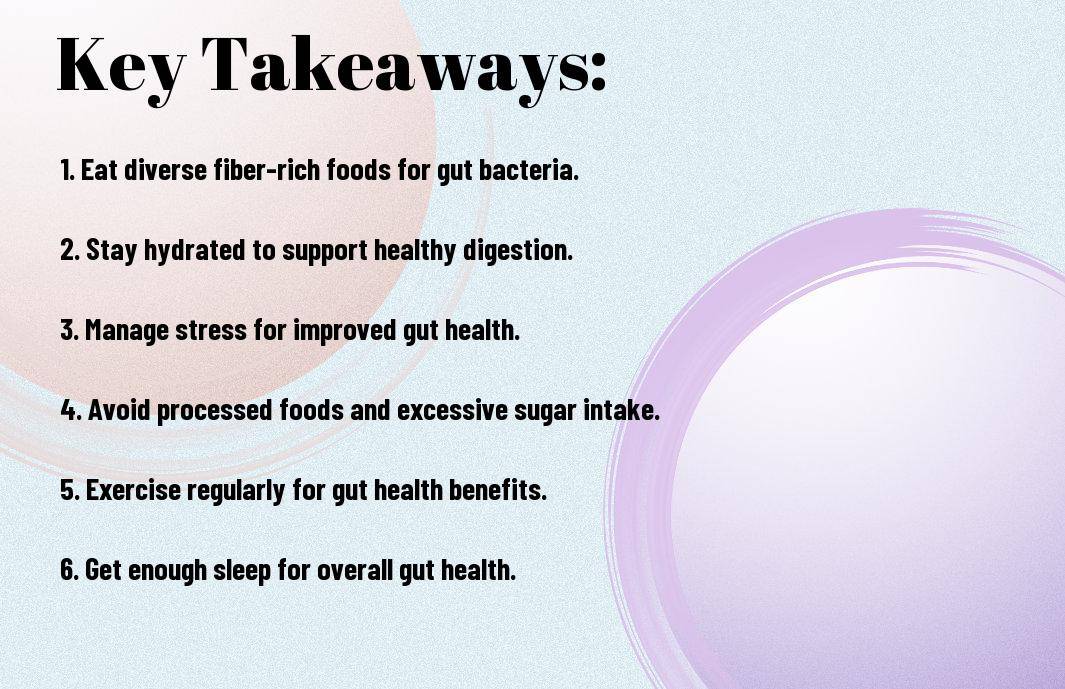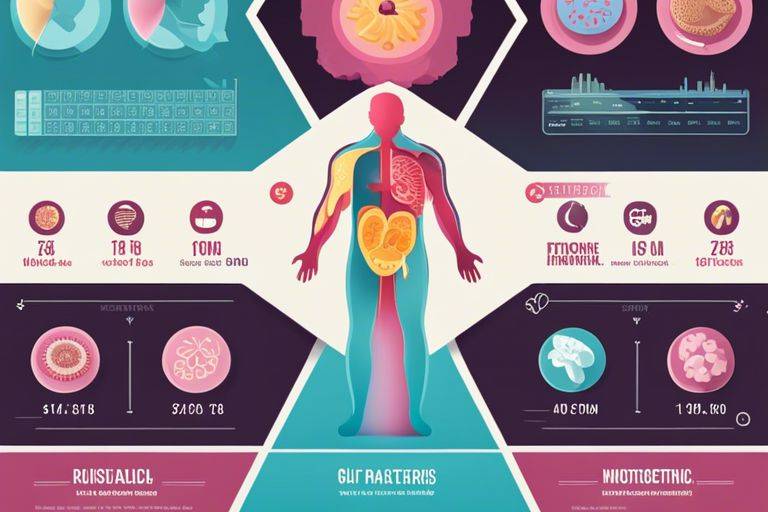Many aspects of our well-being hinge on the health of the gut. As Dr. Andrew Weil often emphasizes, a healthy gut is key to overall wellness. In this blog post, I will share 20 important tips to help you take care of your gut health and improve your digestion. From incorporating probiotic-rich foods to reducing stress levels, these tips are crucial for maintaining a happy gut and promoting a healthier lifestyle.
Key Takeaways:
- Probiotics are crucial: Incorporate probiotic-rich foods like yogurt, kefir, and kimchi into your diet to improve gut health.
- Fiber is your friend: Consuming a variety of fiber-rich foods such as fruits, vegetables, and whole grains promotes a healthy gut microbiome.
- Stay hydrated: Drinking plenty of water helps with digestion and keeps your gut functioning properly.
- Reduce stress: Chronic stress can negatively impact gut health, so prioritize stress-reducing activities like meditation or yoga.
- Avoid antibiotics when unnecessary: Antibiotics can disrupt the balance of gut bacteria, so only take them when prescribed by a healthcare professional.
- Limit processed foods: Processed foods are often low in fiber and nutrients, which can harm your gut microbiome. Focus on whole, nutrient-dense foods instead.
- Listen to your body: Pay attention to how your body reacts to certain foods and lifestyle habits, as everyone’s gut health needs are unique.


Building a Strong Foundation
While it’s important to address any immediate tummy troubles, such as those outlined in 10 tummy troubles you should never ignore, it’s equally crucial to build a strong foundation for gut health. Here are some vital tips to consider:
Eat a Balanced Diet Rich in Fiber
With a balanced diet, fiber plays a crucial role in maintaining a healthy gut. Fiber helps to regulate digestion, promotes the growth of good bacteria in the gut, and supports overall colon health. Including a variety of fruits, vegetables, whole grains, nuts, and seeds in your meals can provide the fiber your gut needs to thrive.
Stay Hydrated with Plenty of Water
For optimal gut health, hydration is key. Drinking an adequate amount of water throughout the day helps to maintain the mucosal lining of the intestines, supports proper digestion, and aids in the elimination of waste products. Aim to drink at least 8-10 glasses of water daily to keep your gut functioning optimally.
Adequate hydration also helps to prevent constipation, a common digestive issue that can lead to discomfort and potential complications if left untreated. Bear in mind, water is vital for all bodily functions, and your gut health is no exception. Stay hydrated for a happy gut!

Managing Stress for a Healthy Gut
You can’t underestimate the impact that stress has on your gut health. Chronic stress can disrupt the balance of good bacteria in your gut, leading to inflammation and digestive issues. To combat this, I recommend incorporating stress-management techniques into your daily routine.
Practice Mindfulness and Meditation
Stress can wreak havoc on your gut health, but practicing mindfulness and meditation can help calm your mind and reduce stress levels. Taking just a few minutes each day to meditate or practice deep breathing can make a world of difference in supporting a healthy gut.
Get Enough Sleep to Support Gut Health
Enough sleep is crucial for a healthy gut. Studies have shown that lack of sleep can alter the composition of your gut microbiota, leading to increased inflammation and a weakened immune system. Aim for 7-9 hours of quality sleep each night to support optimal gut health.
To prioritize sleep, establish a relaxing bedtime routine, such as avoiding screens before bed, creating a peaceful sleep environment, and sticking to a consistent sleep schedule. These habits can promote better sleep quality and ultimately benefit your gut health.
Beneficial Foods for Gut Health
Incorporate Fermented Foods into Your Diet
One way to support your gut health is by incorporating fermented foods into your diet. These foods, such as kimchi, sauerkraut, and kombucha, are rich in beneficial probiotics that help to balance the bacteria in your gut, promoting better digestion and overall gut health.
Enjoy Probiotic-Rich Foods Like Yogurt and Kefir
One of the easiest ways to boost your gut health is by enjoying probiotic-rich foods like yogurt and kefir. These dairy products are packed with live cultures that can help improve your gut flora, strengthen your immune system, and enhance nutrient absorption.
Probiotic-rich foods like yogurt and kefir are necessary for maintaining a healthy gut microbiome. These foods contain live bacteria cultures that can help balance the good and bad bacteria in your gut, promoting better digestion and overall gut health. Including these foods in your diet regularly can help improve your gut health and support your immune system.
Eat Prebiotic-Rich Foods Like Asparagus and Bananas
Asparagus and bananas are examples of prebiotic-rich foods that can nourish the good bacteria in your gut. These foods contain fiber that acts as fuel for the beneficial microbes in your digestive system, helping them thrive and support your gut health.
To support your gut health, including prebiotic-rich foods like asparagus and bananas in your diet can help feed the good bacteria in your gut, promoting a diverse and healthy gut microbiome. These foods can also improve digestion, reduce inflammation, and enhance nutrient absorption, all of which are crucial for overall gut health.
Foods to Avoid for Gut Health
Limit Processed and High-Sugar Foods
Despite their convenience, processed foods and those high in sugar can wreak havoc on your gut health. An excessive intake of these foods can disrupt the balance of good bacteria in your gut, leading to inflammation and digestive issues.
Avoid Artificial Sweeteners and Food Additives
The consumption of artificial sweeteners and food additives can have a negative impact on your gut health. The artificial sweeteners may disrupt the gut microbiota, leading to imbalances that can contribute to various health issues. Similarly, many food additives are linked to digestive problems and inflammation, so it’s best to avoid them as much as possible.
The gut is a complex ecosystem that plays a crucial role in your overall health. In terms of artificial sweeteners and food additives, it’s best to avoid them entirely if you can. Opt for whole, natural foods instead to support a healthy gut microbiome and promote optimal digestive function.
Reduce or Eliminate Gluten and Dairy if Necessary
Limiting or eliminating gluten and dairy from your diet may be necessary for some individuals with gut health issues. These foods can be triggers for inflammation and digestive discomfort, especially for those with sensitivities or intolerances. Pay attention to how your body reacts after consuming gluten and dairy to determine if they are best avoided for your gut health.
Artificial sweeteners and additives can disrupt the gut microbiome and lead to inflammation, affecting overall digestive health. Limiting or eliminating gluten and dairy may be beneficial for some individuals to reduce triggers for gut inflammation and discomfort. It’s necessary to listen to your body and make informed choices when it comes to nourishing your gut for optimal well-being.
Lifestyle Changes for a Healthy Gut
Exercise Regularly to Boost Gut Health
All your lifestyle choices play a role in maintaining a healthy gut, but exercise is a crucial component. On top of supporting overall well-being, regular physical activity boosts gut health by promoting the diversity of beneficial bacteria in your digestive system.
Manage Your Weight to Reduce Gut Inflammation
Boosting gut health involves managing your weight effectively. Excess weight can lead to inflammation in the gut, potentially disrupting the balance of good bacteria. By maintaining a healthy weight through a balanced diet and regular exercise, you reduce the risk of gut inflammation.
Reduce: Excess weight can lead to chronic low-grade inflammation in the gut, which is linked to various health issues such as inflammatory bowel disease and insulin resistance. By managing your weight, you can help reduce inflammation and support a healthier gut.
Limit Antibiotic Use to Preserve Gut Bacteria
For the sake of your gut health, it’s important to limit antibiotic use whenever possible. Antibiotics can disrupt the delicate balance of bacteria in your gut, potentially leading to digestive issues and compromising your immune system.
For the preservation of your gut health, it’s vital to only take antibiotics when absolutely necessary. Overuse of antibiotics can kill off both harmful and beneficial bacteria in your gut, leading to long-term disruptions in gut health. Opt for natural remedies whenever possible and consult with your healthcare provider on alternative treatments.

Supplements and Probiotics for Gut Health
Not all supplements are created equal when it comes to gut health. According to Avoid these common mistakes to have a healthier gut, it’s necessary to choose the right ones and use them properly. Here are some tips to help you navigate the world of supplements and probiotics to support your gut health.
Consider Adding a Probiotic Supplement to Your Routine
To promote a healthy balance of gut bacteria, adding a probiotic supplement to your daily routine can be beneficial. Look for a probiotic that contains a variety of strains and colony-forming units (CFUs) to ensure you are getting the most benefits for your gut health.
Prebiotic: Look into Prebiotic Supplements to Support Gut Bacteria
Prebiotics are necessary for feeding the good bacteria in your gut. These supplements contain fiber that your body can’t digest but that nourishes beneficial bacteria. By incorporating prebiotic supplements into your diet, you can support the growth of healthy gut bacteria and improve your overall gut health.
An easy way to introduce prebiotics into your diet is by consuming foods such as bananas, garlic, onions, and oats, which are naturally rich in prebiotic fibers. However, for a more concentrated dose of prebiotics, supplements are also available. Make sure to choose a reputable brand that offers high-quality prebiotic supplements to reap the full benefits.
Adding Omega-3 Fatty Acids Can Also Support Gut Health
Adding omega-3 fatty acids to your diet can have a positive impact on your gut health. Omega-3s have anti-inflammatory properties that help reduce gut inflammation and support a healthy microbiome. Fish oil supplements are a common source of omega-3 fatty acids and can be a helpful addition to your gut health regimen.
Supplements can be a valuable addition to your gut health routine, but it’s important to remember that they are not a substitute for a healthy diet and lifestyle. Always consult with a healthcare provider before starting any new supplement regimen to ensure it is safe and appropriate for you.
Conclusion
Presently, I hope you find these 20 gut health tips helpful on your journey to improving your digestive health. Note, taking care of your gut is imperative for overall well-being and can have a significant impact on your immune system, mood, and energy levels. By incorporating these tips into your daily routine, you can support a healthy gut and promote a balanced and thriving body.
FAQ
Q: Why is gut health important?
A: Gut health is important because the gut is linked to various aspects of our overall health, including digestion, immunity, mental health, and more.
Q: How can poor gut health affect our bodies?
A: Poor gut health can lead to symptoms such as bloating, gas, diarrhea, constipation, fatigue, and even impact mental health conditions like anxiety and depression.
Q: What are some signs of an unhealthy gut?
A: Signs of an unhealthy gut may include frequent stomach issues, unintentional weight changes, food intolerances, constant fatigue, and skin problems.
Q: What are some foods that promote good gut health?
A: Foods that promote good gut health include high-fiber foods like fruits, vegetables, whole grains, fermented foods like yogurt and kimchi, and foods rich in probiotics like kefir.
Q: How important is hydration for gut health?
A: Hydration is crucial for gut health as it helps maintain the balance of good bacteria in the gut and supports proper digestion and nutrient absorption.
Q: Can stress impact gut health?
A: Yes, stress can impact gut health by altering the gut microbiome, leading to inflammation, and worsening digestive issues or conditions like irritable bowel syndrome (IBS).
Q: How can I improve my gut health?
A: You can improve your gut health by eating a diverse range of plant-based foods, staying hydrated, managing stress, getting enough sleep, exercising regularly, and avoiding excessive use of antibiotics.



